
As a befuddled John Kerry scuttles back and forth between the United States and Egypt attempting to broker a “ceasefire,” 15-year-old Tariq Abu Khdeir has offered a solution to the conflict so obvious one can only assume US officials overlooked it. “If the Israelis give everyone the same rights,” Khdeir told a cramped room at the Rayburn Congressional Office Building, “there will be peace in the Middle East.” Khdeir knows firsthand about Israel’s disparate treatment of individuals. He made international headlines when video surfaced on the internet showing Israeli police beating the restrained and unconscious Palestinian-American teenager.
Khdeir, along with his mother Suha Abu Khdeir and the family’s attorney Hassan Shibly, has been meeting with members of Congress, their staff and State Department officials to share the story of the brutality he endured at the hands of the world’s leading recipient of US aid. As part of their trip, on August 1, 2014, they joined a group of panelists for a Congressional briefing organized by the US Campaign to End the Israeli Occupation entitled, “Is Israel complying with US and international laws?”
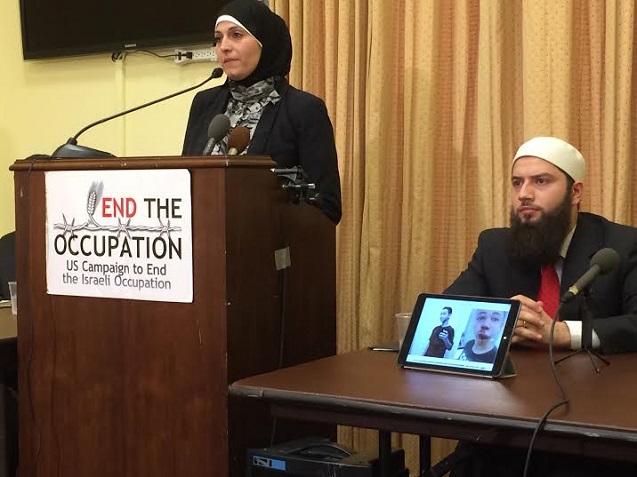 Suha Abu Khdeir, mother of Tariq, who was present in Jerusalem when he was assaulted and fought for her son’s release from Israeli jail; and Hassan Shibly, the family attorney (also Executive Director Council on American-Islamic Relations – Florida). (Photo: Chip Gibbons)
Suha Abu Khdeir, mother of Tariq, who was present in Jerusalem when he was assaulted and fought for her son’s release from Israeli jail; and Hassan Shibly, the family attorney (also Executive Director Council on American-Islamic Relations – Florida). (Photo: Chip Gibbons)
Given Congress’ seemingly unanimous support of Israel’s latest actions, the room was surprisingly packed – so much so that the organizers had to hold the panel not once, but twice in a row so that the large number of Congressional staffers, activists and media could all get a chance to hear the speakers. Many tried to listen from the hall and others, including Rep. Keith Ellison (D-Minnesota), the only Congressperson present, squeezed onto the floor.
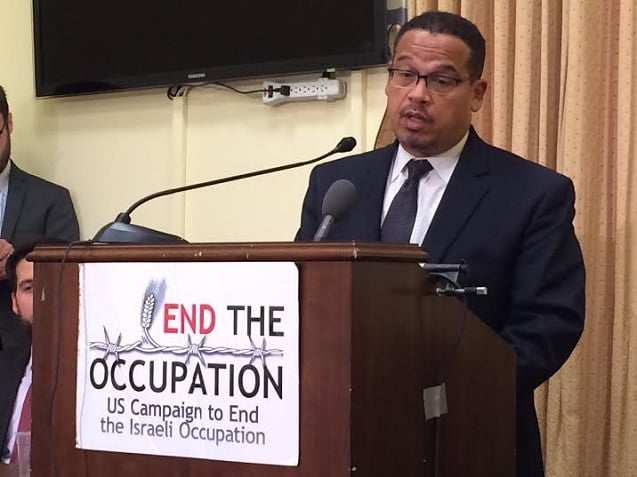 Rep. Keith Ellison. (Photo: Chip Gibbons) Khdeir told the packed room about the treatment he faced in Israel, when he visited his family for six weeks during the summer of 2014. Upon his arrival in Israel, he was held for 10 hours at the airport. While visiting his family in East Jerusalem, he “forgot” that he “had freedom” as Palestinians have “no rights.” The first friend that he made during his six-week visit was his cousin Mohammed Abu Khdeir. On July 2, 2014, Tariq Abu Khdeir asked Mohammed if he wanted anything from the bakery and when he returned the police were there. Mohammed had been kidnapped and it would later be discovered that the 17-year-old had been stabbed and burned alive. “How could they do that to a person?” Khdeir wanted to know.
Rep. Keith Ellison. (Photo: Chip Gibbons) Khdeir told the packed room about the treatment he faced in Israel, when he visited his family for six weeks during the summer of 2014. Upon his arrival in Israel, he was held for 10 hours at the airport. While visiting his family in East Jerusalem, he “forgot” that he “had freedom” as Palestinians have “no rights.” The first friend that he made during his six-week visit was his cousin Mohammed Abu Khdeir. On July 2, 2014, Tariq Abu Khdeir asked Mohammed if he wanted anything from the bakery and when he returned the police were there. Mohammed had been kidnapped and it would later be discovered that the 17-year-old had been stabbed and burned alive. “How could they do that to a person?” Khdeir wanted to know.
Outrage amongst Palestinians over the brutal killing of Mohammed Abu Khdeir led to demonstrations across East Jerusalem. Tariq Abu Khdeir was viewing these demonstrations from an alley. At one point he noticed a group of people yelling a “bunch of words” and soon realized soldiers were chasing them. Khdeir, afraid, ran away with the group, jumping over a fence to escape from the alley.
When the police caught him, they slammed his face into the ground, zip tied his hands behind his back, and proceeded to kick him in the head and ribs. Khdeir went unconscious, but the video shows the police dragging the unconscious teen and continuing to kick him in the head. When Khdeir woke up, he was blindfolded in an Israeli jail.
After holding Khdeir for six hours, they finally took him to a doctor. The doctor informed the Israeli police that Khdeir was bleeding internally and needed urgent medical care. The Israeli police responded by returning Khdeir to jail. Khdeir would stay in jail for four days before he was finally brought to an Israeli court. He was sentenced to nine days house arrest – in spite of the fact that he was never charged with a crime.
Khdeir’s mother recounted an equally painful narrative. When her son was handcuffed to a bed unconscious, she had to argue with the Israeli police guarding the helpless teen over her right to visit him. After insisting that she was his mother and she should be allowed to see her son, the Israeli police relented – on the condition she did not attempt to talk to, go near or touch her son. Seeing her son for the first time after the beating was like seeing a stranger – his face was so badly distorted she could not recognize him. To this day, she cannot watch the video of her son’s beating that has shocked the world. “What if he was screaming for help and I could not be there to help him?”
When Khdeir’s family came back with a representative from the US consulate, they did not fare much better. The police first denied both the parents and consular official Josh Wagner a visitation with Khdeir. Wagner was persistent and after three hours of calling both the US and Israeli government on the phone, he was permitted to see the young American. Khdeir’s parents were denied visitation.
The police were not just unhelpful. According to Suha Abu Khdeir, the police taunted her, saying that Mohammed Abu Khdeir was only the first Palestinian child to die. They told her 300 Palestinian children would be murdered – 100 for each of the Israeli teenagers murdered. Suha Abu Khdeir could not understand that mentality. She was merely a mother who wanted to see her son; she had nothing to do with the brutal killing of the three Israeli teens. Why would they torment her son, her family? The answer was very clear. They were being treated as “worse than second-class citizens” because they were Palestinian.
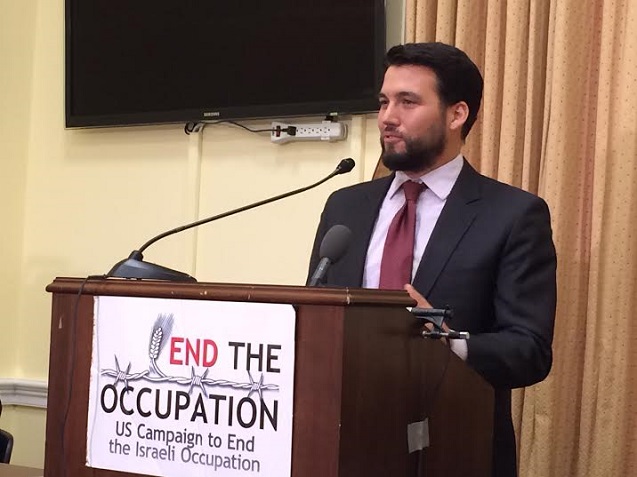 Brad Parker, International Advocacy Officer at Defence for Children International – Palestine. (Photo: Chip Gibbons) While Israel’s justice system may seem bizarre and Kafkaesque – holding individuals without charge, kicking a restrained child in the head – this is the norm for the treatment of Palestinians. As Brad Parker, who joined Khdeir at the Congressional briefing, explained, “His case is horrific, but it is not exceptional. It is a typical case.” Parker would know, as he works with Defense for Children International-Palestine, an organization founded to provide legal aid to Palestinian children in Israeli military courts.
Brad Parker, International Advocacy Officer at Defence for Children International – Palestine. (Photo: Chip Gibbons) While Israel’s justice system may seem bizarre and Kafkaesque – holding individuals without charge, kicking a restrained child in the head – this is the norm for the treatment of Palestinians. As Brad Parker, who joined Khdeir at the Congressional briefing, explained, “His case is horrific, but it is not exceptional. It is a typical case.” Parker would know, as he works with Defense for Children International-Palestine, an organization founded to provide legal aid to Palestinian children in Israeli military courts.
Sunjeev Bery, director of Middle East/North Africa advocacy at Amnesty International, described the West Bank as having a “racist, dual track system of law.” Khdeir was held under the Israeli civilian legal system, as Palestinians living in East Jerusalem usually are. Even though East Jerusalem is considered to be part of the occupied territories, in 1967 Israel extended Israeli civilian law to East Jerusalem and in 1980 declared all of Jerusalem to be its capital. Palestinians in the occupied West Bank, on the other hand, are always subject to military law – even though Israeli settlers living there are subject to Israeli civilian law. According to Parker, Palestinians do not fare much better under civilian law than military law. Parker explained that when it comes to the legal proceedings Palestinians face at the hands of Israel, “It’s not a justice system; it’s a system of control.”
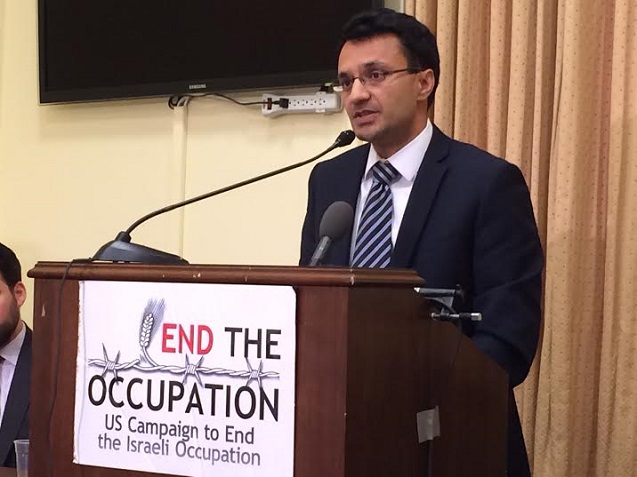 Sunjeev Bery, Advocacy Director for Middle East and North Africa at Amnesty International USA. (Photo: Chip Gibbons) The large crowd in attendance was motivated in part by the growing outrage over Israel’s military assault on Gaza, as well as a chance to see Khdeir whose story has moved many. Both of these factors can be attributed to the unprecedented role social media has played in galvanizing opposition to Israel’s policies. Israel and its supporters have long sought to impose a system of control over the official narrative, but with pictures and videos of the carnage reaped on civilians leaking out of Gaza or the video of Khdeir’s brutalization at the hands of the Israeli state, that system is crumbling.
Sunjeev Bery, Advocacy Director for Middle East and North Africa at Amnesty International USA. (Photo: Chip Gibbons) The large crowd in attendance was motivated in part by the growing outrage over Israel’s military assault on Gaza, as well as a chance to see Khdeir whose story has moved many. Both of these factors can be attributed to the unprecedented role social media has played in galvanizing opposition to Israel’s policies. Israel and its supporters have long sought to impose a system of control over the official narrative, but with pictures and videos of the carnage reaped on civilians leaking out of Gaza or the video of Khdeir’s brutalization at the hands of the Israeli state, that system is crumbling.
Yet, Israel’s bombing of a civilian power plant, a war crime under international law, may have the effect of imposing a blockade on the images coming out of Gaza. As Amnesty International’s Bery explained, Palestinians cannot take cellphone videos if they can’t charge their cellphones. Laila El-Haddad, a former Al Jazeera reporter who was a member of the panel, remarked that within 24 hours after the bombing of Gaza’s sole power plant, the Gaza tweeters had “gone silent.” Israel has given no rationale for its illegal bombing of Gaza’s power plant, but given the widespread coverage of the role of social media contributing to Israel’s defeat in the information war, it certainly had the effect of at least temporarily reestablishing the Israeli system of control over the narrative.
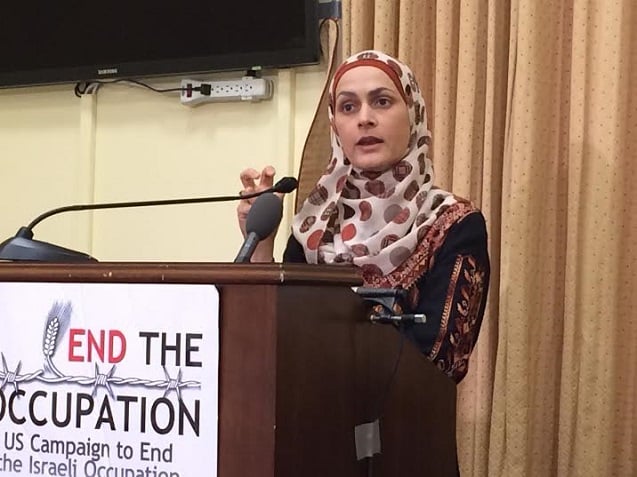 Laila El-Haddad, author of Gaza Mom and former Al Jazeera reporter. (Photo: Chip Gibbons) Even after experiencing the racist and discriminatory policies of the Israeli state, Khdeir feels privileged to be an American. Khdeir’s three cousins, arrested on the same day as he was, are still in jail without charge. Khdeir believes that his US citizenship is what saved him from a similar fate. Khdeir does not believe this is fair as “we should all have rights; we should all be treated equally because we are human.” The racist dehumanization of the Palestinian people was the clear running theme throughout the briefing. The panelists from both Amnesty International and Defense for Children International-Palestine detailed how Israeli soldiers routinely kill Palestinians, including children, with impunity. Amnesty International has released a report on the subject – its title is “Trigger Happy.” It is also clear that this racist dehumanization of the Palestinian people helped to pave the way for the sustained campaign of war crimes Israel has unleashed yet again upon the people of the Gaza Strip.
Laila El-Haddad, author of Gaza Mom and former Al Jazeera reporter. (Photo: Chip Gibbons) Even after experiencing the racist and discriminatory policies of the Israeli state, Khdeir feels privileged to be an American. Khdeir’s three cousins, arrested on the same day as he was, are still in jail without charge. Khdeir believes that his US citizenship is what saved him from a similar fate. Khdeir does not believe this is fair as “we should all have rights; we should all be treated equally because we are human.” The racist dehumanization of the Palestinian people was the clear running theme throughout the briefing. The panelists from both Amnesty International and Defense for Children International-Palestine detailed how Israeli soldiers routinely kill Palestinians, including children, with impunity. Amnesty International has released a report on the subject – its title is “Trigger Happy.” It is also clear that this racist dehumanization of the Palestinian people helped to pave the way for the sustained campaign of war crimes Israel has unleashed yet again upon the people of the Gaza Strip.
While Khdeir and his parents are happy to be home, their family in East Jerusalem continues to be subjugated by the Israeli government. Not only are Khdeir’s three cousins still detained, but the day he left Israel, the Israeli government raided the family’s home and detained even more family members without charge. Khdeir’s lawyer, Hassan Shibly, views this as a clear act of retaliation for Khdeir speaking out. Khdeir stated that his six-week visit to Israel was only a small taste of what all Palestinians go through. Khdeir’s mother said that she has the same sympathy for all children who are wrongfully detained or even killed, as “No mother, no other mother, must go through the pain that I went through.”
The Congressional briefing was broadcast on C-SPAN 2, although the network frequently cut away to show the Senate vote on funding for Iron Dome. It can be viewed in its entirety here.
Our most important fundraising appeal of the year
December is the most critical time of year for Truthout, because our nonprofit news is funded almost entirely by individual donations from readers like you. So before you navigate away, we ask that you take just a second to support Truthout with a tax-deductible donation.
This year is a little different. We are up against a far-reaching, wide-scale attack on press freedom coming from the Trump administration. 2025 was a year of frightening censorship, news industry corporate consolidation, and worsening financial conditions for progressive nonprofits across the board.
We can only resist Trump’s agenda by cultivating a strong base of support. The right-wing mediasphere is funded comfortably by billionaire owners and venture capitalist philanthropists. At Truthout, we have you.
We’ve set an ambitious target for our year-end campaign — a goal of $250,000 to keep up our fight against authoritarianism in 2026. Please take a meaningful action in this fight: make a one-time or monthly donation to Truthout before December 31. If you have the means, please dig deep.